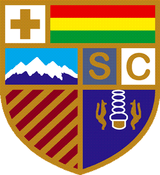Colegio San Calixto, La Paz
| Colegio San Calixto, La Paz | |
|---|---|
 | |
| Location | |
|
Calle Jenaro Sanjinés # 701 La Paz, Bolivia | |
| Information | |
| Type | Jesuit, Catholic |
| Motto | In all, love and serve |
| Denomination | All faiths |
| Established | 1882 |
| Director | Enrique Suarez Gobilard |
| Teaching staff | 61 |
| Grades | 1-12 |
| Gender | Coeducational |
| Enrollment | 2000 |
| Website | Calixto |
Colegio San Calixto, La Paz, was founded by the Society of Jesus in 1882, at the instigation of Mons. Calixto Clavijo, and in his honor named for the third century martyr Pope Callixtus I. It offers primary and secondary education.
History
The school began in the residence of Marshal Andrés de Santa Cruz, now a national monument. The Jesuits began teaching with around 40 students. Over the years other works became associated with the Jesuit college including San Calixto Observatory[1] of which it is written: "A further improvement followed the installation at La Paz (Bolivia), with reports beginning 1 May 1913. La Paz at once became, and still remains, the most important single seismological station of the world. This is a consequence of its isolated location, the sensitive instruments, and the great care with which records were interpreted and reports issued under the direction of Father Descotes."[2] Also, the school's Radio Fides was a pioneer in the business, beginning broadcasting in 1939. In 1989 a Bolivian stamp was issued to commemorate the 50th anniversary of the station.[3][4] On its centennial in 1982 the College was awarded the highest award from the Bolivian state, "Andean Condor."[5]
Varia
San Calixto has introduced various innovative educational plans for Bolivia, including an "Experimental Curriculum" (PEE) in 1963, "Experimental Alternative Plan" (EAP) in 1992, a "Modular System" since 1998, and "Educational Project of the Schools of the Society of Jesus" (ISSP) in 2000. These last two initiatives are seen as furthering the goal of the College to educate "men and women for others."[6] Other initiatives embraced by the school are involving parents more in their child's education and a community service component, which connects students with other schools and orphanages; service is also fostored through the Center for Multidisciplinary Studies and Services (CEMSE).[7]
References
- ↑ Observatory. Accessed 25 June 2016.
- ↑ B. Gutenberg and C.F. Richter, Seismicity Of The Earth And Associated Phenomena. (New Jersey: Princeton, 1949)
- ↑ Stamp. Accessed 25 June 2016.
- ↑ Fides radio. Accessed 25 June 2016.
- ↑ History. Accessed 25 June 2016.
- ↑ For others. Accessed 26 June 2016.
- ↑ Expansion. Accessed 25 June 2016.
Coordinates: 16°29′35.12″S 68°8′6.19″W / 16.4930889°S 68.1350528°W